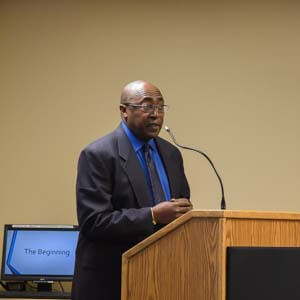Dr. Ellison Shares Story on Race and Diversity
SLV Health
ALAMOSA To Martin Luther King Jr. Day, Dr. Dennard Ellison, an otolaryngologist at San Luis Valley Health, spoke about growing up during segregation on Monday.

"It's very easy and safe to say that I would not be here without the efforts of Dr. King and his colleagues during the Civil Rights Movement," Ellison said. Ellison joined SLV Health as an ear, nose, and throat (ENT) specialist in 2010 and is currently on the board of trustees. He is only one of 150 black ENT specialists in the country today. But before that, he was born and raised in Jacksonville, Florida. Since he was born in 1960, four years before the passage of the Civil Rights Act, the word "Negro" was printed on his birth certificate. Ellison was born at Brewster Hospital, the first African-American hospital in the country because it was the only hospital that his parents were allowed to enter.
Ellison cites his great-grandmother Victoria Johnson as a major influence of his life. She was born in 1876 and died in 1982, witnessing many changes throughout her life. Her older siblings were born into slavery and she saw the creation of the first light bulb, automobile, and airplane. She lived through the Great Depression and segregation and was able to see Ellison graduate from college. Ellison's mother commuted three hours south to teach while his father worked the night shift in the post office so Johnson took care of him during the day. "I'm a living, standing example of someone who had a connection to that time," said Ellison. "She instilled in me that we can always be better than where we came from by always looking forward."
His grandfather, Henry James Jackson, was a research chemist for the army at Picatinny Arsenal in New Jersey. There, Ellison saw racial diversity and coexistence for the first time when he would visit. Jackson, a classmate of Martin Luther King Sr. at Morehouse College, taught Ellison the importance of an education. "He showed me that as a black man he could succeed in a field that's not predominantly African-American ."
In 1972 Ellison became that first and only African-American in his prep school for seventh, eighth and ninth grade. He studied hard, graduated in the top 10 percent of his class and got accepted into Dartmouth College. "I wanted to prove that I belonged there and that I wasn't there as a quota."
From there he went to the University of Florida for medical school and graduated in 1986. Ellison worked at Martin Luther King Jr. Hospital in Los Angeles for his residency. Ellison ended his talk by discussing the need for diversity in healthcare. "Other areas such as business got it early," Ellison said. "Healthcare has lagged behind. We must address the needs of diversity within healthcare because our country is becoming more diverse yet our healthcare providers are not." He said that if a patient can better relate to their provider then they are more likely to follow directions and have a better outcome.
"The patient-physician relationship is the utmost important thing in healthcare. I've practiced in affluent La Jolla, a suburb of San Diego. I've practiced in the coalfields of Appalachia in West Virginia. I've practiced in the inner city of Los Angeles in the Watts neighborhood. Because of the experiences I've had I can relate to that gang member or laid off coal miner."